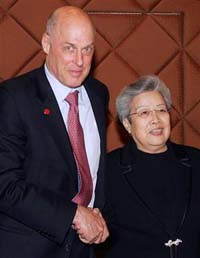US, China sign trade agreements

Critics of Beijing's massive trade surplus must be satisfied by a new agreement signed by China and the United States . The deal will encourage tourism to America and increase manufacturing safeguards over Chinese products.
The agreements came on the first day of a series of trade talks that Washington hopes will yield real progress on increasing U.S. exports to China. Washington's trade deficit with China appears set to surpass last year's record US$233 billion (EUR159 billion), according to U.S. Commerce Department figures, amplifying calls in Congress for punishing legislation over what some call unfair Chinese trade practices.
Coinciding with talks, China announced that its global trade surplus totaled US$26.28 billion in November, showing strong foreign demand for low-cost Chinese goods despite product recalls and warnings over faulty or tainted Chinese goods ranging from toothpaste to tires.
For the first 11 months of the year, China's global trade surplus has reached US$238.9 billion, 53 percent more than the same period a year ago, the Chinese government said.
Such increases are sure to complicate their task, and officials from both sides warned of the danger of protectionist measures, with U.S. Commerce Secretary Carlos Gutierrez saying the answer was to boost U.S. exports rather than limit imports from China.
In an attempt to emphasize the positives in their relationship, officials attended a ceremony marking the opening of the New York Stock Exchange's representative office in Beijing - a bid to attract more listings from China's rapidly expanding and more capitalistic economy.
U.S. Treasury Secretary Henry Paulson and Chinese Vice Premier Wu Yi joined in cutting a red ribbon strewn across a brightly festooned stage at a villa on the scenic grounds of the Diaoyutai State Guest House where Tuesday's talks were held.
In later remarks, Gutierrez praised the long-awaited tourism accord that allows Chinese groups travel to the United States, saying that would "open a large and growing market for the U.S. travel and tourism industry." Now Chinese can only travel to the U.S. for business or studies.
Other agreements include one on developing and producing biofuels and opening up China's second-tier cities to U.S. exports, along with expanding U.S. access to Chinese markets for goods and services from agriculture to telecommunications.
China's exports have come under intense scrutiny this year because a number of potentially deadly chemicals have been found in goods including toothpaste, toys and seafood. The international outrage gathered speed in March after a tainted pet food ingredient made in China was blamed for the deaths of cats and dogs in North America.
U.S. Health Secretary Mike Leavitt said two agreements boosting the safety of food and animal feed and drugs and medical devices would "enhance the safety of scores of household items the American people consume on a daily basis."
A Health Department statement said the agreements will boost information exchanges and require exporters to register.
"To keep up with the pace of global commerce, we need a fundamental shift from trying to catch unsafe products as they come in, to building quality and safety into products before they reach our borders," Leavitt said.
The quality of Chinese exports has been a contentious issue between the countries, Wu, the vice premier, said Tuesday that big steps had been made in the last few months in improving China's product safety. However, she added there remained gaps between developing and developed countries in standards and supervision.
"This means we need to expand our common ground and jointly strengthen our supervision and control efforts to improve product quality," she said in a commentary published in the Asian Wall Street Journal on Tuesday.
Illustrating the complex nature of their thriving but contentious trade relationship, Gutierrez said the daylong China-U.S. Joint Commission on Commerce and Trade started with China strongly objecting to U.S. action on intellectual property rights.
He said Wu, China's top negotiator, communicated "very strongly and very directly that she felt very uncomfortable" with a recent case on intellectual property rights the U.S. took to the World Trade Organization.
The WTO opened an investigation last month into Chinese restrictions on the sale of American movies, music and books - Washington's fourth commercial complaint against Beijing in a little over a year.
Wu did not mention the dispute in her opening remarks to the joint commission but alluded to what she called "inharmonious noises" in trade relations.
She singled out a rising number of bills in the U.S. Congress targeting Chinese imports as well as media reports questioning the safety of Chinese products. Those had "seriously harmed the reputation of Chinese exports and the nation's image," she said.
"If there were to be limits on or protectionist measures taken against normal trade, that would only harm our mutual interests and would not help solve the problem," Wu said.
Tuesday's talks on near-term regulatory and legal issues, and will be followed Wednesday and Thursday by the Strategic Economic Dialogue that grapples with longer-term economic plans. Paulson will lead the U.S. side in those discussions, held at a government conference center about two hours outside Beijing.
Subscribe to Pravda.Ru Telegram channel, Facebook, RSS!


